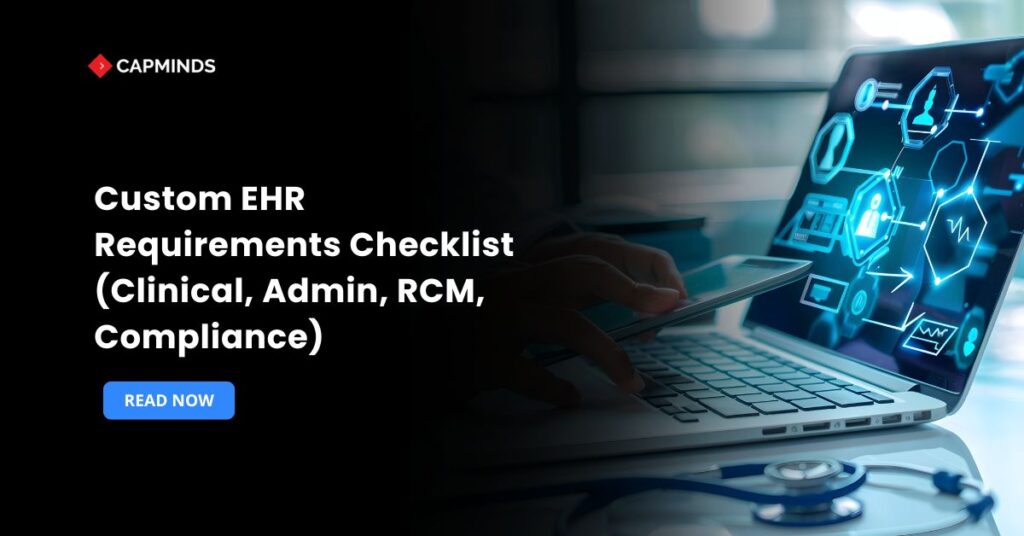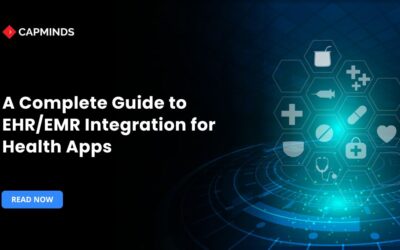Custom EHR Requirements Checklist (Clinical, Admin, RCM, Compliance)
An EHR system serves as the focal point for patient care, administration, compliance, and financial operations in the digital health system. It is more than just a digital document. Custom EHR software development allows healthcare organizations to design features that actually support clinical and operational excellence, ensuring that the solution is tailored to their specific processes.
When determining what makes an EHR effective, healthcare management should carefully outline the clinical EHR needs, patient recording requirements, lab integration in EHR, customized clinical processes, and, most importantly, maintain a HIPAA-compliant EHR environment.
This checklist will help you know the necessary needs in the clinical, administrative, revenue cycle management, and compliance areas.
Clinical EHR Requirements
The fundamental feature of any EHR is its clinical efficiency. Providers, nurses, and care teams are using the system to record care within a short time, retrieve detailed histories of the patients, and align effectively. That is, your custom EHR should be workflow-friendly on the side of the provider.
The patient charting must have templates of history taking, progress notes, medication lists, and allergies. No repetitive clicks should be made when a provider is documenting. The interface is supposed to be intuitive, not wasting time on the screen, and spend more time with patients.
The main characteristics that should be considered in your clinical EHR are:
- Specialty-specific documentation templates that are customizable.
- Dictation and intelligent note-taking suggestions.
- High-level drug interaction and alerts.
- Combined prescription, imaging, and referral order sets.
EHR lab integration is essential. The direct links to labs and imaging centers will provide automatic delivery of the results and minimize the delays and errors.
The clinicians should be capable of real-time results, comparison with previous trends, and taking action on the results. With these tailored workflows in the clinical setting, there is more efficiency in carrying out care and better patient outcomes.
Administrative Requirements
Beyond clinical care, an EHR can also be used for practice administration. Efficient scheduling, patient interactions, and task management help the staff to assist both the provider and the patients effectively.
The administrative checklist for the custom EHR development must contain:
- Automated confirmation of patient self-scheduling.
- SMS/email/patient portal appointment reminders.
- Patient-Provider secure message.
- Registration Insurance verification tools.
- Front desk and back-office staff assignment and monitoring.
Administrative functionality, when created correctly, helps to eliminate front-desk bottlenecks and to minimize no-shows.
Example:
Automated appointment reminders reduce the number of missed appointments by up to 30%, which has a direct effect on the efficiency of the clinic. Patient forms can be handled electronically, and this helps in reducing paperwork and errors.
Going to a digital-first workflow saves time for the staff and improves patient experience. Being able to update their demographics online, get access to test results, and communicate safely, patients feel more connected and involved in their care.
Related: Custom EHR Blueprint: From Discovery to Go-Live in 90 Days
Revenue Cycle Management Requirements
A robust EHR must help the bottom line. In most of the practices, RCM gaps result in delayed payments, rejected claims, and revenue drains. These risks are mitigated by integrating the RCM capabilities into your EHR.
At least, your own EHR development must cover:
- Real-time eligibility and benefits checking.
- Automated claim generating and scrubbing.
- Resubmission and tracking tools for denials.
- Inbuilt coding assistance (ICD-10, CPT, HCPCS)
- On-site payments and customer account management.
All claims begin at the clinical documentation phase. This is the reason why the patient charting requirements need to be linked to the coding and billing modules, also.
By connecting the documentation with the revenue activities, the providers can minimize their mistakes and achieve the right filing of claims at the earliest stage.
The result? Faster reimbursements, reduced claims denials, and healthier cash flow. KPIs associated with RCM performance can also be monitored by administrators, including clean claim rate, days in accounts receivable, and trends in denials, with integrated reporting and analytics, enabling them to implement data-driven changes in RCM performance.
Compliance Requirements
No EHR system would be complete without high compliance capabilities. Healthcare organizations are highly regulated, and your system should ensure patient privacy, security, and reporting needs.
An EHR that is compliant with HIPAA is a must. This implies that all modules, such as clinical charting and billing, should secure patient data by encryption, secure access, and audit trails. In addition to HIPAA, there are other compliance requirements, such as ONC certification, MACRA/MIPS reporting, as well as specialty-specific registries.
Your checklist of compliance in custom EHR must contain:
- Multi-factor authentication and role-based access control.
- Extensive auditing of system activity.
- Inbuilt federal/state program compliance reporting.
- ES data interchange to HL7 and FHIR standards.
- Data integrity, disaster recovery/ backup planning.
Being compliant does not only mean not facing punishment. It builds trust. Patients would like to be assured that their personal health information is secure. Clinicians and administrators should be certain that the system will help them make accurate, compliant reporting without causing needless burden.
Why a Custom EHR Development Approach Matters
Although off-the-shelf EHRs can be compatible with standard features, they do not always function as per the specific requirements of different care settings. There are also various workflows, documentation requirements, and reporting requirements of a small primary care practice, a specialty clinic, and a multi-site hospital system.
That is where the development of personal EHR comes in. By designing tailored features that fit your specific clinical EHR needs, bringing the lab together, and creating a customizable clinical workflow, your organization will have a system that will not hinder operations.
Compliance tools and RCM tools can be adjusted to your particular payer mix, regulatory requirements, and business objectives.
A tailored approach ensures:
- Clinicians save time in specialty charting.
- Patients are the beneficiaries of improved communication speed and access to lab results.
- Administrators minimize mistakes by using automated scheduling and verification.
- Finance teams maximize revenue through embedded denial management and clean claims.
- IT leaders ensure regulatory-readiness using the HIPAA-compliant EHR framework.
Comprehensive Digital Health Tech Services by CapMinds
At CapMinds, we understand that building an effective EHR goes beyond technology; it requires aligning clinical, administrative, financial, and compliance workflows into one seamless solution. That’s why we offer end-to-end digital health tech services designed to empower healthcare organizations of every size.
Our Custom EHR development services are built to simplify patient care, streamline administration, secure compliance, and optimize revenue.
Whether you need a fully tailored EHR, integration with existing systems, or compliance-ready enhancements, CapMinds delivers with precision and expertise.
With CapMinds, you gain:
- Custom EHR/EMR Development – Specialty-specific workflows, charting, and lab integration
- Revenue Cycle Management Services– Clean claim submissions, denial management, and faster reimbursements
- Compliance & Security – HIPAA-compliant EHR systems with audit trails and secure access
- Ongoing Support & Scalability – Future-ready solutions that grow with your practice
Let CapMinds help you transform your healthcare operations with smarter, secure, and efficient digital health solutions.




